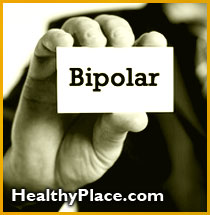How To Explain Bipolar Disorder to Others
 Detailed tips to explain bipolar disorder, including signs and symptoms, to a loved one.
Detailed tips to explain bipolar disorder, including signs and symptoms, to a loved one.
How do you explain your, or a loved one's, condition to the others? Here are a few sentences to help you organize your thoughts. Choose the most appropriate explanations and modify as needed.
Here's How:
- Stripped down to basics, people with bipolar disorder have mood swings, from elation to depression, that don't necessarily have anything to do with what's going on in their lives.
- Bipolar disorder is also called manic depression, and it appears to be caused by electrochemical abnormalities in the brain.
- TV shows like to show people with bipolar disorder as criminals, but don't worry - only a small percentage are ever violent, and I'm not one of them!
- "Mania" and "manic" don't mean "crazy" - they refer to extra high emotions, full of energy, fast-talking, not needing much sleep [add appropriate symptoms].
- I am a rapid cycler - that means I can be ultra-excited one day and deeply depressed the next, for no obvious reason. [Modify this to fit the person's cycle pattern.]
- I get into what are called "mixed states" when I seem to have a lot of energy but at the same time am really down, angry or panicky.
- There are a lot of possible medications for bipolar disorder. My doctor has started me out on _____, but if that doesn't work, we'll just try something else.
- When I'm manic, I have particular problems with [choose symptoms like: spending too much money, talking too much, not making a lot of sense].
- Inappropriate anger can be a symptom of bipolar disorder. I might say or have said hurtful things that I really don't mean - I'm sorry! Finding the right medication should help control that behavior.
- When I get depressed or into a mixed state, I sometimes feel suicidal. That's my illness talking - but it's serious. You might have to get me to a hospital if I seem really bad.
- Bipolar disorder seems to be inherited but the exact cause is not known yet.
- Don't worry if I _________ [behavior you and your doctor agree is symptomatic but not dangerous by itself].
- If I start ________ [behavior you and your doctor agree is dangerous], tell me to call my doctor, or take me to the hospital.
Tips:
- All of the above can be modified to be about someone else, not yourself - e.g., "He is a rapid cycler" or "she gets into mixed states."
- Educate yourself as much as possible about your condition by reading up on it, and urge close family members to do the same.
- Give careful consideration to whom and to what extent you share these very personal details about yourself. There are those who will simply never understand. If you lose a friend, it is their loss!
next: Dealing with Family Tensions Caused by Bipolar Disorder
~ bipolar disorder library
~ all bipolar disorder articles
APA Reference
Staff, H.
(2009, January 2). How To Explain Bipolar Disorder to Others, HealthyPlace. Retrieved
on 2026, January 28 from https://www.healthyplace.com/bipolar-disorder/articles/how-to-explain-bipolar-disorder-to-others
Last Updated: April 7, 2017



